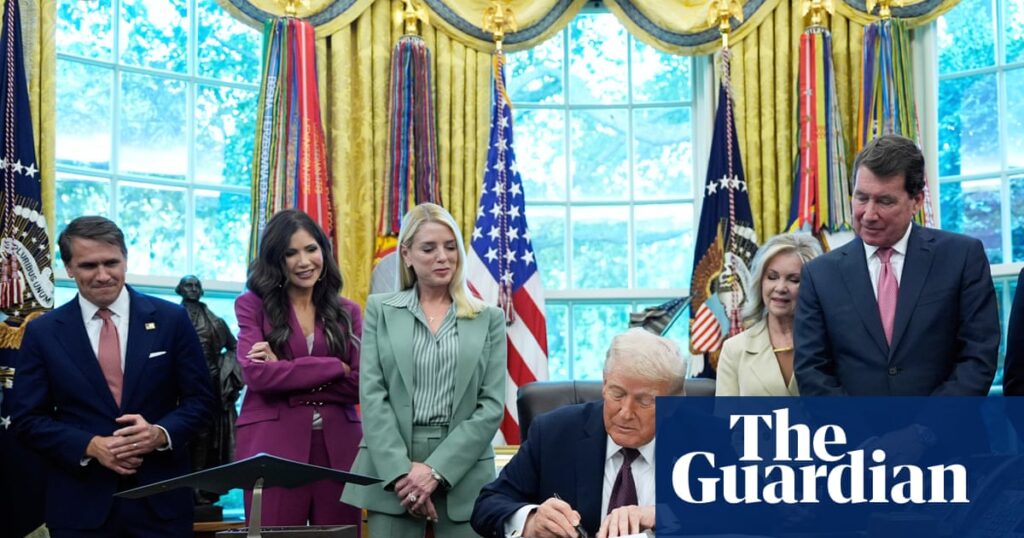
In a significant move to address urban crime, President Donald Trump signed an executive order on Monday to deploy National Guard troops to Memphis. The decision is part of the administration’s broader strategy to combat crime in cities governed by Democrats. Tennessee’s Republican Governor, Bill Lee, expressed his support for the initiative, standing alongside Trump in the Oval Office as the president signed a memo establishing the Memphis Safe Task Force.
“We’re going to fix that just like we did Washington,” Trump stated, referencing the previous deployment of federal forces to the nation’s capital. The task force will see National Guard troops collaborating with federal agencies, including the FBI, the Bureau of Alcohol, Tobacco, Firearms and Explosives, the Drug Enforcement Administration, Immigration and Customs Enforcement, the US Marshals Service, and the Department of Justice. Trump cited alarming crime statistics and pledged to end what he described as “savagery” to “make Memphis safe again.”
Support and Criticism of the Deployment
Governor Lee expressed gratitude for the federal intervention, stating, “I’m tired of crime holding the great city of Memphis back.” Trump assured Lee that the crackdown would be his “proudest moment” and predicted a significant reduction in crime within weeks. The announcement was also attended by Tennessee’s Republican senators, Marsha Blackburn and Bill Hagerty.
The deployment in Memphis mirrors a similar strategy employed in Washington, D.C., last month, where Trump federalized the city’s police force. This action was taken despite violent crime rates already being at a 30-year low in the capital.
Chicago: The Next Potential Target
Speculation has been rife about Chicago being the next city to receive federal intervention. However, the administration faces strong opposition from Illinois’s Democratic Governor, JB Pritzker, and Chicago’s Democratic leadership. Despite this, Trump indicated that Chicago might be next on the list, although he suggested that deployment was not yet imminent. “We don’t want to lose Chicago,” Trump said, mentioning his personal connection to the city through his “great, beautiful building” on the skyline.
Governor Pritzker criticized the potential deployment, calling it a “terrible idea” and expressing hope that Trump would reconsider. “We never really know what he intends to do,” Pritzker remarked earlier on Monday. However, Trump later reiterated that his administration would proceed regardless of Pritzker’s stance. “We hope we have the governor’s help,” Trump said, “But if we don’t, we’re doing it without him.”
Expanding the Federal Response
Trump also mentioned other cities, including St. Louis, New Orleans, and Baltimore, as potential future targets for federal intervention. “We want to save these places,” he asserted, signaling a possible expansion of his administration’s strategy.
The announcement comes amid a backdrop of national debates over federal intervention in local law enforcement. Critics argue that such measures undermine local governance and escalate tensions, while supporters claim they are necessary to restore order in crime-plagued areas.
Historical Context and Expert Opinions
The use of federal forces in domestic law enforcement is not unprecedented but remains controversial. Historically, such interventions have been reserved for extraordinary circumstances, such as civil rights enforcement in the 1960s. Legal experts warn that frequent use of federal forces could set a concerning precedent, potentially infringing on states’ rights and local autonomy.
According to Professor Jane Doe, a constitutional law expert at the University of Memphis, “While the federal government has the authority to intervene, it must balance this with respect for local jurisdictions. Overreach could lead to legal challenges and further political polarization.”
Looking Ahead
The implications of Trump’s latest executive order are significant, not only for Memphis but for other cities potentially on the administration’s radar. As the federal government continues to assert its role in local law enforcement, cities across the nation are watching closely, weighing the benefits of reduced crime against the risks of increased federal oversight.
As the situation develops, the administration’s actions will likely continue to spark debate over the appropriate balance between federal authority and local governance. The coming weeks will reveal whether Trump’s predictions of plummeting crime rates materialize and how other cities will respond to similar federal interventions.






